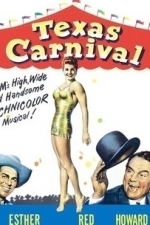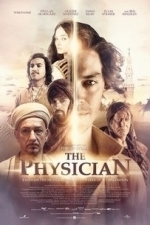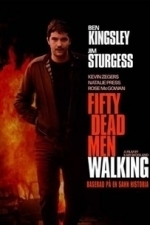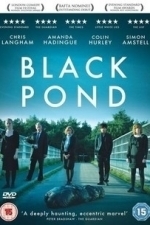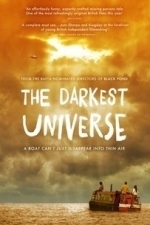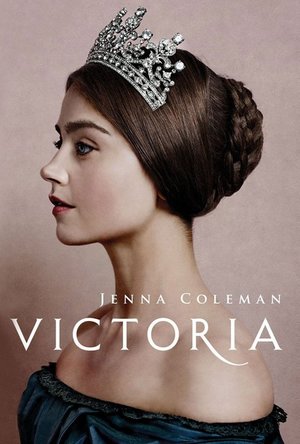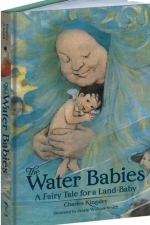Search
Hazel (1853 KP) rated The Water Babies in Books
Oct 9, 2017
Worryingly Controversial
This eBook was provided by the publisher via NetGalley in exchange for an honest review
This year (2017), Calla Editions are printing a new hardback version of the original 1863 children’s classic The Water Babies written by the Anglican clergyman, Charles Kingsley (1819-75). Subtitled “A Fairytale for a land-baby” the book was intended for Kingsley’s youngest son and therefore was targeted at a juvenile demographic. However, as a result of the 1800’s vernacular and particularly deep themes, it has become more appropriate for older readers. With full-colour illustrations by Jessie Wilcox Smith (1863-1935) from the height of the golden age of illustration, this edition promises to be a collector’s item.
Charles Kingsley, the founder of England’s Christian Socialist movement, was exceedingly interested in the plight of the working class, particularly of the abuse and protection of children. This is reflected in his story about Tom, the ten-year-old London chimney sweep, who suffers ill-treatment at the hands of his employer. Tom, who has known nothing but the sooty streets of London, is embarrassed after scaring a beautiful young girl with his grimy appearance. Running away through a countryside he is unfamiliar with, Tom dives into a river to wash, however, falls asleep in the water.
On awakening, Tom discovers he has been transformed into a water baby; he can live and breathe amongst all the fishes and other mystical water creatures. Forgetting his horrible past, Tom is soon frolicking with the characters he meets, teasing and provoking unsuspecting individuals. But the fairies in charge of water babies are determined to teach him many lessons about truth, mercy, justice and courage.
The Water Babies is a morality fable with fairy-tale-like qualities. It educates young readers about the consequences of their actions but also enlightens them about the cruelty of some adults. Kingsley often talks to the reader (in this instance his son), drawing them into the story and making the scenarios as relatable as possible. The magical underwater setting is merely a veil to hide the lessons Kingsley is attempting to preach.
For the adult reader, Kingsley has a much more political message. Written at the time of political and scientific advancement, particularly in respect to the concept of natural selection, Kingsley attempts to ridicule the ideas of thinkers such as Charles Darwin by producing a satirical narrative. He suggests that scientists are fools who use unnecessarily long and foreign terms, evidenced by his use of the made-up subject of Necrobioneopalæonthydrochthonanthropopithekology. He also goes as far as to mock the majority of adults and appears to be completely anti-Irish people.
In some instances, Charles Kingsley goes too far in his satire, resulting in something that would not be accepted by publishers today. In order for Tom to be the hero of the story, adults need to be viewed as less than good – people who need to be punished for their discourteous treatment of children, which in this instance, they are, and quite graphically. But the most controversial theme explored is death. The more naïve may not cotton on to the fact that Tom falling asleep in the river equates to drowning, yet that is exactly what happened. Only through death can one become a water baby. To make matters slightly more alarming, Kingsley does not see this death as a bad thing; he describes Tom’s new life as something far better than life on earth – coming from a clergyman this is understandable – which suggests that death is better than living for an abused child.
Despite these controversies, Kingsley’s prose is humorous and entertaining - far more mind-boggling than you may initially expect. With characters named Mrs Bedonebyasyoudid and Professor Ptthmllnsprts, there is plenty to make readers laugh. Some of the hilarities may go above the heads of children since the jargon is no longer used in today’s society, however, adults will be able to appreciate the comical aspect.
Over 150 years old, The Water Babies has remained a classic. It reveals the political, scientific and social situations of the mid-1800s, yet it contains wisdom that is still relevant today. As Kingsley’s daughter Rose says in the introduction, “What a fine thing it is to love truth, mercy, justice, courage, and all things noble and of good report.” No matter how peculiar this novel is, it says a lot about the virtues of our character.
This year (2017), Calla Editions are printing a new hardback version of the original 1863 children’s classic The Water Babies written by the Anglican clergyman, Charles Kingsley (1819-75). Subtitled “A Fairytale for a land-baby” the book was intended for Kingsley’s youngest son and therefore was targeted at a juvenile demographic. However, as a result of the 1800’s vernacular and particularly deep themes, it has become more appropriate for older readers. With full-colour illustrations by Jessie Wilcox Smith (1863-1935) from the height of the golden age of illustration, this edition promises to be a collector’s item.
Charles Kingsley, the founder of England’s Christian Socialist movement, was exceedingly interested in the plight of the working class, particularly of the abuse and protection of children. This is reflected in his story about Tom, the ten-year-old London chimney sweep, who suffers ill-treatment at the hands of his employer. Tom, who has known nothing but the sooty streets of London, is embarrassed after scaring a beautiful young girl with his grimy appearance. Running away through a countryside he is unfamiliar with, Tom dives into a river to wash, however, falls asleep in the water.
On awakening, Tom discovers he has been transformed into a water baby; he can live and breathe amongst all the fishes and other mystical water creatures. Forgetting his horrible past, Tom is soon frolicking with the characters he meets, teasing and provoking unsuspecting individuals. But the fairies in charge of water babies are determined to teach him many lessons about truth, mercy, justice and courage.
The Water Babies is a morality fable with fairy-tale-like qualities. It educates young readers about the consequences of their actions but also enlightens them about the cruelty of some adults. Kingsley often talks to the reader (in this instance his son), drawing them into the story and making the scenarios as relatable as possible. The magical underwater setting is merely a veil to hide the lessons Kingsley is attempting to preach.
For the adult reader, Kingsley has a much more political message. Written at the time of political and scientific advancement, particularly in respect to the concept of natural selection, Kingsley attempts to ridicule the ideas of thinkers such as Charles Darwin by producing a satirical narrative. He suggests that scientists are fools who use unnecessarily long and foreign terms, evidenced by his use of the made-up subject of Necrobioneopalæonthydrochthonanthropopithekology. He also goes as far as to mock the majority of adults and appears to be completely anti-Irish people.
In some instances, Charles Kingsley goes too far in his satire, resulting in something that would not be accepted by publishers today. In order for Tom to be the hero of the story, adults need to be viewed as less than good – people who need to be punished for their discourteous treatment of children, which in this instance, they are, and quite graphically. But the most controversial theme explored is death. The more naïve may not cotton on to the fact that Tom falling asleep in the river equates to drowning, yet that is exactly what happened. Only through death can one become a water baby. To make matters slightly more alarming, Kingsley does not see this death as a bad thing; he describes Tom’s new life as something far better than life on earth – coming from a clergyman this is understandable – which suggests that death is better than living for an abused child.
Despite these controversies, Kingsley’s prose is humorous and entertaining - far more mind-boggling than you may initially expect. With characters named Mrs Bedonebyasyoudid and Professor Ptthmllnsprts, there is plenty to make readers laugh. Some of the hilarities may go above the heads of children since the jargon is no longer used in today’s society, however, adults will be able to appreciate the comical aspect.
Over 150 years old, The Water Babies has remained a classic. It reveals the political, scientific and social situations of the mid-1800s, yet it contains wisdom that is still relevant today. As Kingsley’s daughter Rose says in the introduction, “What a fine thing it is to love truth, mercy, justice, courage, and all things noble and of good report.” No matter how peculiar this novel is, it says a lot about the virtues of our character.
Hazel (1853 KP) rated The Water Babies in Books
Dec 7, 2018
<i>This eBook was provided by the publisher via NetGalley in exchange for an honest review </i>
This year (2017), Calla Editions are printing a new hardback version of the original 1863 children’s classic <i>The Water Babies</i> written by the Anglican clergyman, Charles Kingsley (1819-75). Subtitled “<i>A Fairytale for a land-baby</i>” the book was intended for Kingsley’s youngest son and therefore was targeted at a juvenile demographic. However, as a result of the 1800’s vernacular and particularly deep themes, it has become more appropriate for older readers. With full-colour illustrations by Jessie Wilcox Smith (1863-1935) from the height of the golden age of illustration, this edition promises to be a collector’s item.
Charles Kingsley, the founder of England’s Christian Socialist movement, was exceedingly interested in the plight of the working class, particularly of the abuse and protection of children. This is reflected in his story about Tom, the ten-year-old London chimney sweep, who suffers ill-treatment at the hands of his employer. Tom, who has known nothing but the sooty streets of London, is embarrassed after scaring a beautiful young girl with his grimy appearance. Running away through a countryside he is unfamiliar with, Tom dives into a river to wash, however, falls asleep in the water.
On awakening, Tom discovers he has been transformed into a water baby; he can live and breathe amongst all the fishes and other mystical water creatures. Forgetting his horrible past, Tom is soon frolicking with the characters he meets, teasing and provoking unsuspecting individuals. But the fairies in charge of water babies are determined to teach him many lessons about truth, mercy, justice and courage.
<i>The Water Babies</i> is a morality fable with fairy-tale-like qualities. It educates young readers about the consequences of their actions but also enlightens them about the cruelty of some adults. Kingsley often talks to the reader (in this instance his son), drawing them into the story and making the scenarios as relatable as possible. The magical underwater setting is merely a veil to hide the lessons Kingsley is attempting to preach.
For the adult reader, Kingsley has a much more political message. Written at the time of political and scientific advancement, particularly in respect to the concept of natural selection, Kingsley attempts to ridicule the ideas of thinkers such as Charles Darwin by producing a satirical narrative. He suggests that scientists are fools who use unnecessarily long and foreign terms, evidenced by his use of the made-up subject of <i>Necrobioneopalæonthydrochthonanthropopithekology</i>. He also goes as far as to mock the majority of adults and appears to be completely anti-Irish people.
In some instances, Charles Kingsley goes too far in his satire, resulting in something that would not be accepted by publishers today. In order for Tom to be the hero of the story, adults need to be viewed as less than good – people who need to be punished for their discourteous treatment of children, which in this instance, they are, and quite graphically. But the most controversial theme explored is death. The more naïve may not cotton on to the fact that Tom falling asleep in the river equates to drowning, yet that is exactly what happened. Only through death can one become a water baby. To make matters slightly more alarming, Kingsley does not see this death as a bad thing; he describes Tom’s new life as something far better than life on earth – coming from a clergyman this is understandable – which suggests that death is better than living for an abused child.
Despite these controversies, Kingsley’s prose is humorous and entertaining - far more mind-boggling than you may initially expect. With characters named Mrs Bedonebyasyoudid and Professor Ptthmllnsprts, there is plenty to make readers laugh. Some of the hilarities may go above the heads of children since the jargon is no longer used in today’s society, however, adults will be able to appreciate the comical aspect.
Over 150 years old, <i>The Water Babies</i> has remained a classic. It reveals the political, scientific and social situations of the mid-1800s, yet it contains wisdom that is still relevant today. As Kingsley’s daughter Rose says in the introduction, “What a fine thing it is to love truth, mercy, justice, courage, and all things noble and of good report.” No matter how peculiar this novel is, it says a lot about the virtues of our character.
This year (2017), Calla Editions are printing a new hardback version of the original 1863 children’s classic <i>The Water Babies</i> written by the Anglican clergyman, Charles Kingsley (1819-75). Subtitled “<i>A Fairytale for a land-baby</i>” the book was intended for Kingsley’s youngest son and therefore was targeted at a juvenile demographic. However, as a result of the 1800’s vernacular and particularly deep themes, it has become more appropriate for older readers. With full-colour illustrations by Jessie Wilcox Smith (1863-1935) from the height of the golden age of illustration, this edition promises to be a collector’s item.
Charles Kingsley, the founder of England’s Christian Socialist movement, was exceedingly interested in the plight of the working class, particularly of the abuse and protection of children. This is reflected in his story about Tom, the ten-year-old London chimney sweep, who suffers ill-treatment at the hands of his employer. Tom, who has known nothing but the sooty streets of London, is embarrassed after scaring a beautiful young girl with his grimy appearance. Running away through a countryside he is unfamiliar with, Tom dives into a river to wash, however, falls asleep in the water.
On awakening, Tom discovers he has been transformed into a water baby; he can live and breathe amongst all the fishes and other mystical water creatures. Forgetting his horrible past, Tom is soon frolicking with the characters he meets, teasing and provoking unsuspecting individuals. But the fairies in charge of water babies are determined to teach him many lessons about truth, mercy, justice and courage.
<i>The Water Babies</i> is a morality fable with fairy-tale-like qualities. It educates young readers about the consequences of their actions but also enlightens them about the cruelty of some adults. Kingsley often talks to the reader (in this instance his son), drawing them into the story and making the scenarios as relatable as possible. The magical underwater setting is merely a veil to hide the lessons Kingsley is attempting to preach.
For the adult reader, Kingsley has a much more political message. Written at the time of political and scientific advancement, particularly in respect to the concept of natural selection, Kingsley attempts to ridicule the ideas of thinkers such as Charles Darwin by producing a satirical narrative. He suggests that scientists are fools who use unnecessarily long and foreign terms, evidenced by his use of the made-up subject of <i>Necrobioneopalæonthydrochthonanthropopithekology</i>. He also goes as far as to mock the majority of adults and appears to be completely anti-Irish people.
In some instances, Charles Kingsley goes too far in his satire, resulting in something that would not be accepted by publishers today. In order for Tom to be the hero of the story, adults need to be viewed as less than good – people who need to be punished for their discourteous treatment of children, which in this instance, they are, and quite graphically. But the most controversial theme explored is death. The more naïve may not cotton on to the fact that Tom falling asleep in the river equates to drowning, yet that is exactly what happened. Only through death can one become a water baby. To make matters slightly more alarming, Kingsley does not see this death as a bad thing; he describes Tom’s new life as something far better than life on earth – coming from a clergyman this is understandable – which suggests that death is better than living for an abused child.
Despite these controversies, Kingsley’s prose is humorous and entertaining - far more mind-boggling than you may initially expect. With characters named Mrs Bedonebyasyoudid and Professor Ptthmllnsprts, there is plenty to make readers laugh. Some of the hilarities may go above the heads of children since the jargon is no longer used in today’s society, however, adults will be able to appreciate the comical aspect.
Over 150 years old, <i>The Water Babies</i> has remained a classic. It reveals the political, scientific and social situations of the mid-1800s, yet it contains wisdom that is still relevant today. As Kingsley’s daughter Rose says in the introduction, “What a fine thing it is to love truth, mercy, justice, courage, and all things noble and of good report.” No matter how peculiar this novel is, it says a lot about the virtues of our character.

Spielberg
TV Show Watch
Filmmaker Steven Spielberg and his colleagues discuss the classic movies that made him famous,...
documentary biography
